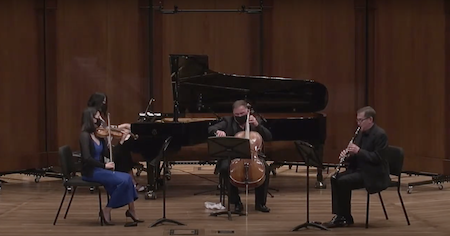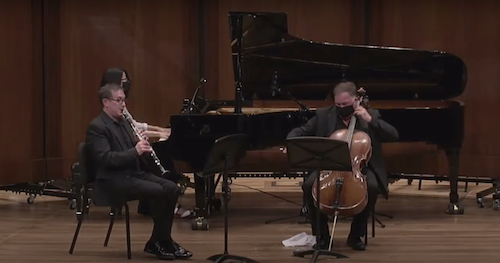by Jarrett Hoffman

The program was worth repeating, especially for the finale, Amanda Harberg’s Lucas’s Garden. Inspired by the section of the family garden over which her son Lucas has free rein, the piece appeals with its directness of expression and its unique, varied language, conveying a thoroughly original sense of happiness in music.
Across its three movements, worldly contentedness makes way for modal-tinged mystery, then a flowing and exciting finish influenced by jazz. Saturday’s performance — vibrant, artful, and precise — delivered all the work’s virtues in spades. It was the perfect ending in terms of mood, and for bringing together the whole quartet: violinist Minju Kim, cellist Keith Robinson, clarinetist Daniel Gilbert, and pianist Donna Lee.
But it almost wasn’t the ending at all. The original order of the program had Libby Larsen’s Songs Without Words for clarinet and piano as the closer. An intriguing piece full of gray-toned murkiness of emotion, it was an excellent pairing with Harberg’s brighter colors, but much better coming beforehand.
Another program change was less successful: moving the “Andante un poco mosso” from Schubert’s Op. 99 Piano Trio to the start of the evening, switching places with Beethoven’s Trio for Clarinet, Cello, and Piano. The Schubert brought lovely lyricism and incredible color changes from Kim, Robinson, and Lee as they navigated the sudden transitions into melancholy and urgency. But such beautiful, slow music is more powerful as something arrived at rather than received upfront.
The Beethoven is a natural introduction, welcoming you with its contrast of vigor and pleasant elegance. On the interpretive side, this performance presented a winning duality: Gilbert’s pure tone and subtle phrasing next to Robinson’s robust timbre and bold contrasts. Even when the same melody was passed from one to the other, you know you were in for a sense of discovery. Not to be outshone, Lee spun out beautiful sounds in the second movement, and impressed with long technical runs in the third.
The meaning of the program’s title, “In Search of Peace,” wasn’t immediately clear. But given the recent eruption of violence in the Middle East, it was a sad bit of irony that the title was chosen months ago.
Published on ClevelandClassical.com May 18, 2021.
Click here for a printable copy of this article




